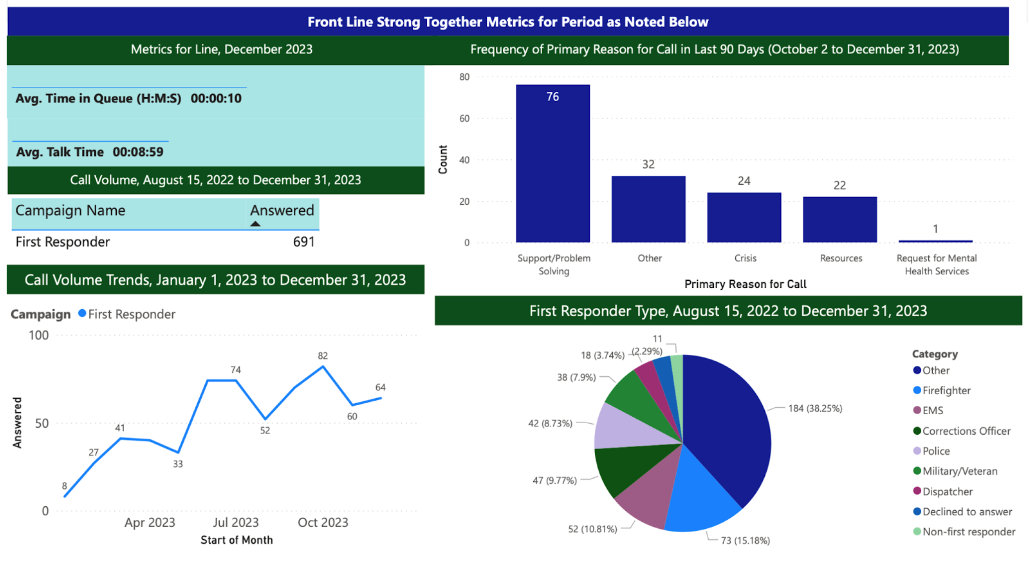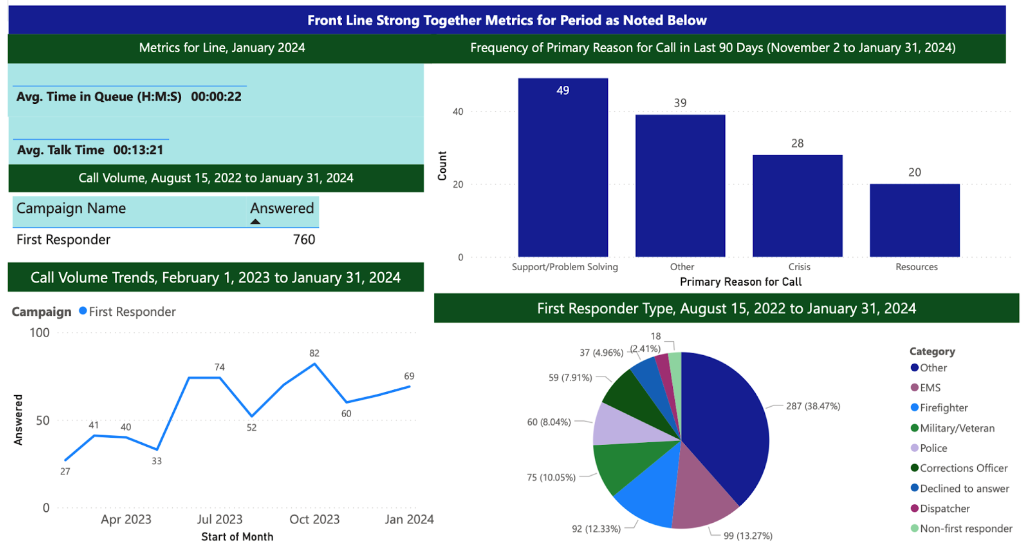POAM congratulates Frontline Strong in supporting the mental health of public law enforcement officers in 2023
The Police Officers Association of Michigan (POAM) believes the Frontline Strong Program in Michigan has demonstrated significant progress in supporting the mental health of public law enforcement officers since its inception at the beginning of 2023.
First Responder Call Volume and Reasons for Contact Summary
Metrics for Line (Latest Month):
Primary Reason for Call (Last 90 Days):
Call Volume (August 15, 2022 to Latest Month):
First Responder Type (August 15, 2022 to Latest Month):
In Aid of Officer Mental Health
The program’s utilization has seen a notable increase, with calls that are answered by trained professionals for service doubling from the first quarter to the last quarter of 2023. The average time in the queue for callers remained low at about 10 seconds, with the average talk time being around 9 minutes.
In the following year, POAM noted the average call length had increased to about 13 minutes, indicating more in-depth conversations or possibly more complex issues being addressed and assisted, while the time in the queue slightly increased to about 20 seconds.
Comparing the data from 2023 to the first month of 2024 (January), the call volume and metrics show a generally increasing need.
Call Volume Trends:
- The call volume in January 2024 (41 answered calls) is lower than the peak in July 2023 (82 answered calls), indicating a decline in call volume.
Average Time in Queue:
- The average time in queue increased from 10 seconds in December 2023 to 22 seconds in January 2024, indicating a longer wait time.
Average Talk Time:
- The average talk time increased from 8 minutes 59 seconds in December 2023 to 13 minutes 21 seconds in January 2024, indicating longer conversations.
Primary Reason for Call:
- The primary reason for calls shifted from “Request for Mental Health Services” (24 calls in December 2023) to “Support/Problem Solving” (49 calls in January 2024), suggesting a change like calls.
Call Volume (August 15, 2022 to Latest Month):
- The total number of answered calls decreased from 691 in December 2023 to 760 in January 2024, indicating a decline in overall call volume.
First Responder Type:
- The percentages of calls from different first responder types (e.g., Firefighter, EMS, Military/Veteran) show some fluctuations between December 2023 and January 2024 but no clear trend of improvement or decline.
Data suggests the call center’s increasing need and usage by the law enforcement community
POAM believes the data reveals a wide range of caller categories and the nature of services sought, showcasing the program’s ability to cater to diverse needs within the law enforcement community. The success and positive reception of the program among its users highlight its effectiveness in providing necessary support. POAM notes the increasing utilization rates are critical for demonstrating the program’s value to the legislature, ensuring its continuation and expansion.
Aiding Law Enforcement Mental Health
Plans for the future include presenting the service to the Michigan Commission on Law Enforcement Standards (MCOLES) as part of academy classes or for continuing education. This move could further integrate mental health support into law enforcement training and professional development, emphasizing the importance of mental health in maintaining a resilient and effective law enforcement workforce.
The data from the charts underscore the program’s importance and potential for a positive impact on the mental health of law enforcement officers. Its success and expansion could serve as a model for similar initiatives nationwide, reinforcing the critical role of mental health support in public safety sectors.




Leave a Reply